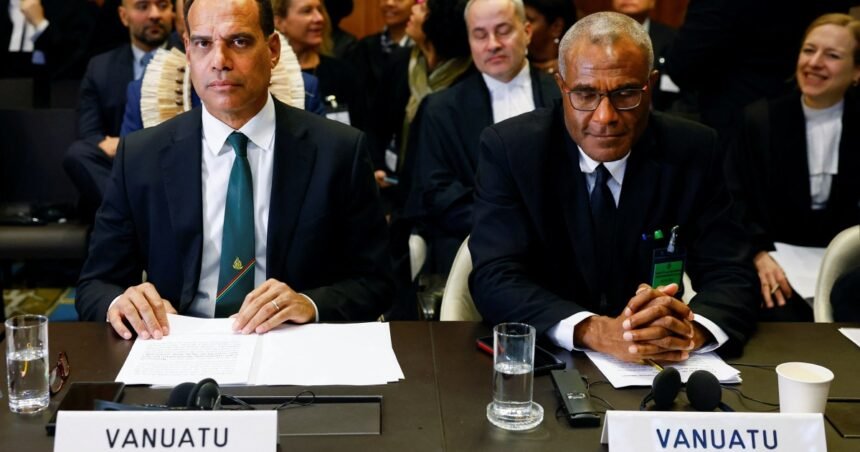The ICJ is about to resolve the longer term course of local weather accountability in a landmark authorized case introduced by Vanuatu.
The Worldwide Court docket of Justice (ICJ) is making ready handy down its first-ever opinion on local weather change, seen by many as a historic second in worldwide legislation.
Judges have waded by means of tens of 1000’s of pages of written submissions and heard two weeks of oral arguments throughout the ICJ’s biggest-ever case.
The court docket’s 15 judges will search to tug collectively completely different strands of environmental legislation into one definitive worldwide customary once they ship their findings on the Peace Palace in The Hague, Netherlands, at 3pm native time on Wednesday (13:00 GMT).
The court docket’s “advisory opinion” is anticipated to run to a number of hundred pages, because it clarifies nations’ obligations to forestall local weather change and the implications for polluters which have failed to take action.
This speaks to the primary query put to the court docket by the South Pacific island nation of Vanuatu and different international locations bringing the case: What duties do international locations should deal with local weather change?
Nations which are prime fossil gasoline polluters say the court docket doesn’t want to handle the query as authorized provisions below the United Nations Framework Conference on Local weather Change (UNFCCC) are sufficient.
However local weather advocates argue that the ICJ ought to undertake a broader method to the problem, together with a reference to human rights legislation and the legal guidelines of the ocean.
Vanuatu urged judges at The Hague to contemplate “your entire corpus of worldwide legislation” in its opinion, arguing the ICJ was uniquely positioned to take action.
The ICJ is “the one worldwide jurisdiction with a basic competence over all areas of worldwide legislation, which permits it to supply such a solution,” the island nation argued.
The judges may also contemplate if there must be authorized penalties for international locations that contribute probably the most to the local weather disaster.
The United States, the world’s largest historic emitter of greenhouse gases, and different prime polluters referred the court docket to the landmark 2015 Paris Settlement on local weather change, which doesn’t explicitly present for direct compensation for previous harm brought on by air pollution.
Points round legal responsibility are thought-about delicate to many international locations in local weather negotiations, however at UN talks in 2022, rich nations did conform to create a fund to assist weak international locations cope with present impacts brought on by previous air pollution.
“We’re hoping that the ICJ will say that it’s a authorized obligation of states to handle local weather change. It’s important to respect different states and their proper to self-determination,” Vanuatu Minister for Local weather Change Ralph Regenvanu mentioned on the eve of the ruling.
“Colonialism is gone – you recognize, supposedly gone – however it is a hangover the place your conduct as a state continues to suppress the way forward for the folks of one other nation,” Regenvanu mentioned.
“And also you don’t have a authorized proper to do this below worldwide legislation. And never solely that, but when your actions have already induced this hurt, there should be reparations for that,” he added.
Vishal Prasad, one in every of 27 then-law college students on the College of the South Pacific who pushed for Vanuatu to take up the case again in 2019, says he’s “emotional, scared, nervous, anxious”, forward of Wednesday’s ruling.
Prasad, who’s now the director of the Pacific Island College students Preventing Local weather Change group, says that local weather change is an “existential downside for younger folks in international locations like Kiribati, in Tuvalu, in Marshall Islands”.
“They’re witnessing the results of local weather change each excessive tide,” he mentioned.
Prasad added that Pacific Island cultures rejoice the idea of “wayfinding”.
“It is advisable appropriate your course if you’re going improper,” he mentioned.
